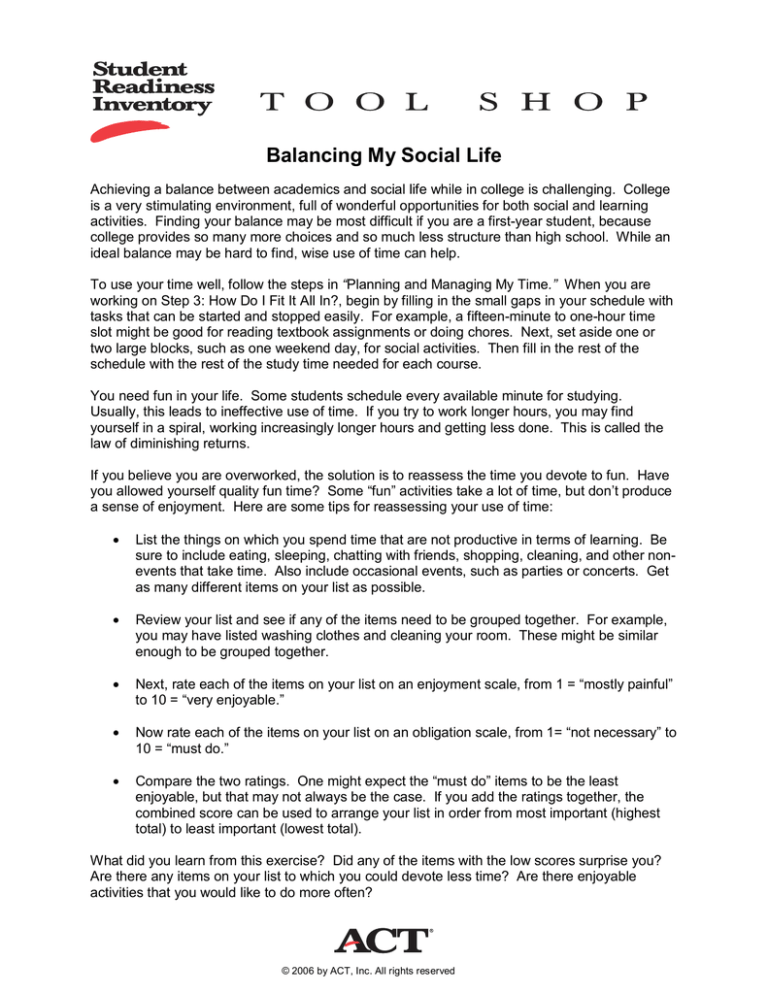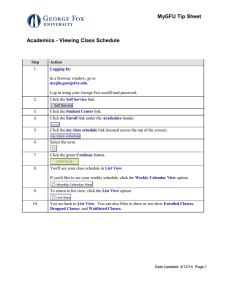
Balancing My Social Life
Achieving a balance between academics and social life while in college is challenging. College
is a very stimulating environment, full of wonderful opportunities for both social and learning
activities. Finding your balance may be most difficult if you are a first-year student, because
college provides so many more choices and so much less structure than high school. While an
ideal balance may be hard to find, wise use of time can help.
To use your time well, follow the steps in “Planning and Managing My Time.” When you are
working on Step 3: How Do I Fit It All In?, begin by filling in the small gaps in your schedule with
tasks that can be started and stopped easily. For example, a fifteen-minute to one-hour time
slot might be good for reading textbook assignments or doing chores. Next, set aside one or
two large blocks, such as one weekend day, for social activities. Then fill in the rest of the
schedule with the rest of the study time needed for each course.
You need fun in your life. Some students schedule every available minute for studying.
Usually, this leads to ineffective use of time. If you try to work longer hours, you may find
yourself in a spiral, working increasingly longer hours and getting less done. This is called the
law of diminishing returns.
If you believe you are overworked, the solution is to reassess the time you devote to fun. Have
you allowed yourself quality fun time? Some “fun” activities take a lot of time, but don’t produce
a sense of enjoyment. Here are some tips for reassessing your use of time:
•
List the things on which you spend time that are not productive in terms of learning. Be
sure to include eating, sleeping, chatting with friends, shopping, cleaning, and other nonevents that take time. Also include occasional events, such as parties or concerts. Get
as many different items on your list as possible.
•
Review your list and see if any of the items need to be grouped together. For example,
you may have listed washing clothes and cleaning your room. These might be similar
enough to be grouped together.
•
Next, rate each of the items on your list on an enjoyment scale, from 1 = “mostly painful”
to 10 = “very enjoyable.”
•
Now rate each of the items on your list on an obligation scale, from 1= “not necessary” to
10 = “must do.”
•
Compare the two ratings. One might expect the “must do” items to be the least
enjoyable, but that may not always be the case. If you add the ratings together, the
combined score can be used to arrange your list in order from most important (highest
total) to least important (lowest total).
What did you learn from this exercise? Did any of the items with the low scores surprise you?
Are there any items on your list to which you could devote less time? Are there enjoyable
activities that you would like to do more often?
© 2006 by ACT, Inc. All rights reserved
2
Below are additional tips for maintaining balance between your social life and academics:
1. Resist temptations.
The real trick is to use the short gaps of unstructured time wisely. If you spend that time
chatting or hanging out, all of your longer blocks of time will be needed to study. Fitting
some of your homework into short blocks and forcing yourself to stay focused can free
up larger portions of your weekends and evenings for fun.
2. Set internal priorities and schedule your time.
There are many ways to spend your time at college. You need to be very clear about
why you are there to stay focused on your long-term goals. It is important to structure
your time and make sure you keep large deadlines in mind. For help on structuring your
time, read the steps in “Planning and Managing my Time,”as well as “Setting Priorities”
and “Achieving My Goals.”
3. Work in the library or a quiet place.
Dorm rooms can be full of distractions: your bed, TV, computer, and other people who
may be relaxing or making noise. Unless you are able to block all of this out, the library
or another quiet place will be a more productive place to study.
4. Choose the right living environment.
Some dorms have a much more serious atmosphere than others. This is also true of
fraternities and sororities. When you choose a place to live, give consideration to your
need for quiet and support for your academic goals.
5. Join a few clubs.
Many of the college-sponsored clubs offer effective ways to enjoy yourself and get to
know others with similar interests. Whatever your passion, chances are that there is a
college-sponsored group that shares it.
6. Take care of your body.
To function at your best, your body needs a balanced diet, exercise, and adequate
sleep. Be sure these needs are addressed in your schedule. You will have more energy
for your academics if you are feeling well.
7. Coordinate your free time with your friends.
As you develop a group of friends, see if you can schedule free time together. This
doesn’t mean taking time away from your studying, but rather shuffling your study time
so you can enjoy your social time.
8. Being a student is a full-time job.
Your academics require your attention every day. While you may spend a weekend day
relaxing, make sure you devote the majority of every weekday to your studies. If you
leave studying to the last minute, there will not be enough time to do a good job.
There is no perfect formula for balancing your social life and academics. Each person must find
a balance that works for them. If you can develop the habits and self-discipline that you need to
manage your time effectively, your anxiety will decrease and you may find that you can really
enjoy your time at college.
If after using these tips you are still having difficulty balancing your activities, ask an advisor or
counselor for assistance.

